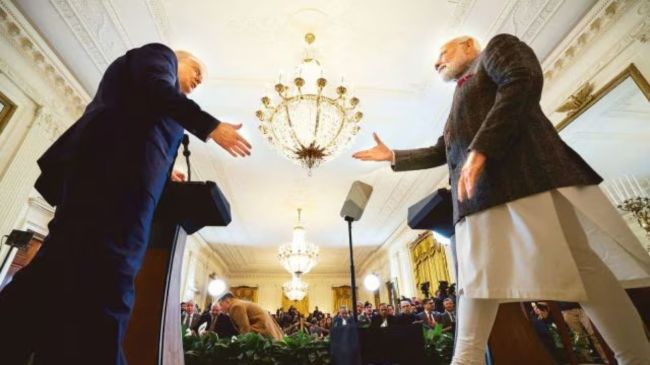Opinion What both the US and Russia don’t understand about today’s India
Tariffs cannot manufacture trust. Mediation cannot overwrite sovereignty. India will keep buying Russian oil because it must
 Trump assumed coercion would bring Delhi to heel. Instead, India reminded Washington it was not Mexico, Japan, or Canada. Trump’s bullying only confirmed what Delhi has long known: America’s friendship often comes with a cost.
Trump assumed coercion would bring Delhi to heel. Instead, India reminded Washington it was not Mexico, Japan, or Canada. Trump’s bullying only confirmed what Delhi has long known: America’s friendship often comes with a cost. By Manoj Sinha and Ramanand Sharma
Prime Minister Modi’s absence in Alaska a few days ago signaled the end of a temporal fantasy once hyped at rallies and whispered in think tanks: The Trump-Putin-Modi triangle. For a moment, it seemed alluring. The idea had flair. But illusions do not bend history. The triangle collapsed not with a dramatic explosion, but with the slow grind of reality.
Trump always approached international politics the way he did real estate deals: As transactions. Nations were customers or competitors, never equals. NATO allies were free riders, Russia and India were dead economies, and trade deficits were personal insults. Tariffs soon became his weapon of choice.
At Houston’s “Howdy Modi” rally, he had basked in camaraderie, hugging Modi before a roaring crowd. Yet the knife was always under the table. By 2019, India’s duty-free trade privileges were scrapped. Last month, Trump slapped 50 per cent tariffs on Indian goods, punishing Delhi for refusing to abandon Russian oil. He accused India of “financing Putin’s war machine,” even as tariffs threatened $87 billion in exports.
For Washington, it was moral posturing, but for India, it was survival. Russian crude at $20–30 cheaper than Brent was oxygen for a nation of 1.4 billion.
Trump assumed coercion would bring Delhi to heel. Instead, India reminded Washington it was not Mexico, Japan, or Canada. Trump’s bullying only confirmed what Delhi has long known: America’s friendship often comes with a cost.
Since 1947, India has refused to mortgage sovereignty to any bloc, be it Washington, Moscow, or Beijing. That explains what looks like a contradiction to the West. India drills with the US Navy while buying Russian S-400s. Modi beams alongside Trump, then lands in Moscow the next week. To Washington, this feels like betrayal. To Delhi, it is sovereignty in action.
If Trump misread India, Putin did too. Isolated and sanctioned, he wooed Modi with oil discounts, defence offers, and a “privileged partnership.” Trade surged to $65 billion, but Putin wanted more: An ideological ally, a BRICS crusader against the West. But PM Modi never abandoned the US Dollar and never let BRICS become anti-American. For Delhi, Moscow was a supplier, a hedge, a lever against China, nothing more. Putin mistook invoices for loyalty.
The triangle cracked when Trump claimed he had “stopped a war”, boasting of mediating between India and Pakistan and later invited Pakistan’s Chief of Army Staff to the White House. For Delhi, this was sacrilege. Kashmir is bilateral for India, never a playground for American theatrics.
Meanwhile, Europe scolds India for buying Russian oil, accusing it of funding Putin. But the hypocrisy is glaring. Europe gorged on Russian gas for decades before discovering a moral conscience. It was Europe, not India, that bankrolled Putin’s war chest. India merely seized an opportunity. Even as refiners sold re-exported fuel back to Europe, Brussels sermonised.
When India asked for alternatives, there was no answer. No subsidies, no discounts, just lectures. India’s choice was clear: It could not allow its economy to be crippled to soothe Europe’s guilt.
Tariffs cannot manufacture trust. Mediation cannot overwrite sovereignty. India will keep buying Russian oil because it must. It will deepen defence ties with Washington because it should. It will trade with Europe, balance China, and shape BRICS, all on its own terms.
The tragedy is that the West still refuses to accept India as an independent pole in a multipolar world. History will not remember the hugs or handshakes. Strongmen may command applause, but national interest will dictate the fate of nations.
Sinha is Principal, Aryabhatta College, University of Delhi. Sharma is an Assistant Professor, Aryabhatta College, University of Delhi


